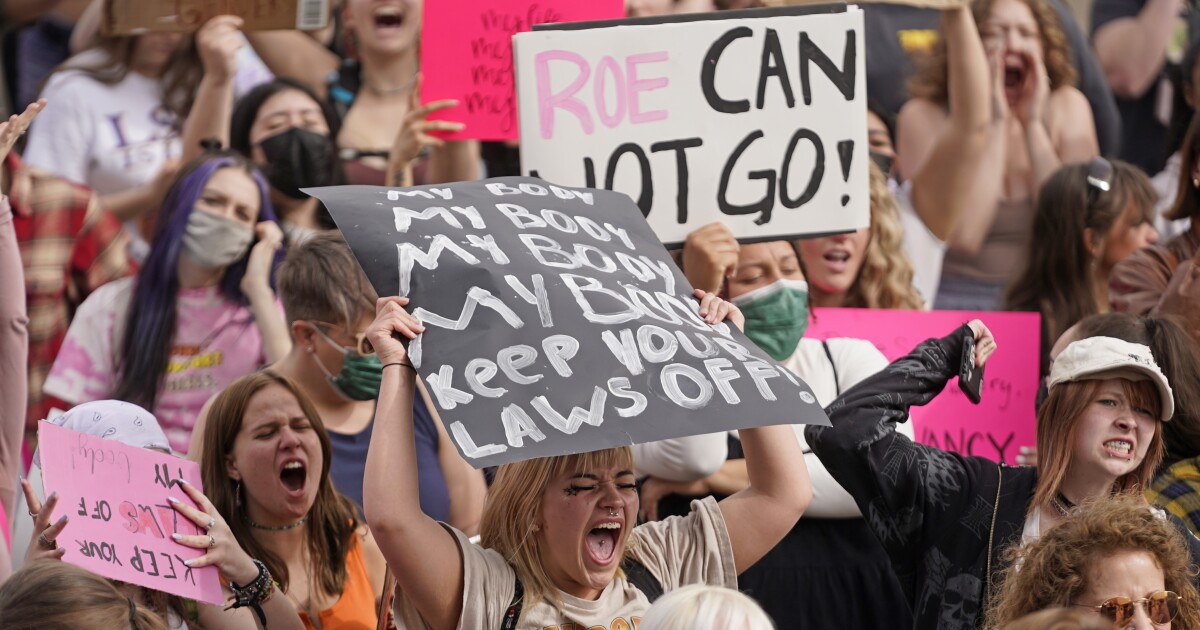

There’s no arguing it.
Republicans were roughed up over the summer and entered the post-Labor Day stretch of the midterm elections in worse shape than they were on Memorial Day. The Democrats, President Joe Biden’s party, enjoyed something of an unexpected political renaissance.
Don’t take my word for it. (I know — you won’t.) Listen to the half-dozen Republican strategists I spoke with Wednesday to get a sense of whether reports of the Democratic Party’s summer resurgence were exaggerated — whether, as the battle for Congress stands nine weeks before Election Day, the GOP wave had receded to a trickle.
“At this point, I see very little evidence of a red wave, and this looks like a more neutral battlefield,” a Republican consultant in the Midwest, far away from the Washington bubble, told me. This operative, as did the others I interviewed, requested anonymity to speak candidly about the party’s current standing.
“It’s been a quite bad three months for Republicans,” added a second Republican strategist who, like the other five I checked in with, is not sitting on the sidelines pontificating on cable television but rather is actively engaged in the campaign on a daily basis and has been since day one of the 2022 election cycle.
“I don’t think we’re in a wave situation. Dobbs took the wind out of that,” concluded a third Republican politico, referring to Dobbs v. Jackson Women’s Health Organization, the Supreme Court ruling that overturned Roe v. Wade and eliminated federal protections for abortion rights. “It gave so much more energy to the other side. Women [voters] are going to be a problem.”
DEMOCRAT MANDELA BARNES SKIPS BIDEN LABOR DAY EVENT IN WISCONSIN
Juiced Democratic intensity to vote in November, fueled by Dobbs but also a flurry of legislative accomplishments on Capitol Hill just prior to Congress’s extended summer recess, has fueled a remarkable recovery for the party in power in the White House. It is evident in Biden’s job approval ratings, generic ballot polls gauging which party voters want running the House and Senate, preferences among independent voters, and victories in two special elections: in the Alaska at-large seat and a swing district in upstate New York.
No doubt aiding this Democratic comeback have been some weak Republican general election candidates and, likely, the reemergence of Donald Trump as the central figure in American political life in the aftermath of the FBI executing a search warrant at Mar-a-Lago, the former president’s residence and private social club in Palm Beach, Florida, as part of a federal investigation into his alleged mishandling of classified documents since leaving the White House.
Inside Elections, a nonpartisan political handicapper, now projects Republicans will win anywhere from 12 to 30 House seats and assesses the fight for control of the 50-50 Senate to be a toss-up. The Cook Political Report with Amy Walter, another top nonpartisan prognosticator, projects net gains for the GOP of 10 to 20 House seats. Jessica Taylor, editor of the outlet’s Senate ratings, wrote this recently: “Right now, we see the range between Democrats picking up one seat and Republicans gaining three. However, the most probable may be a net change of zero or a GOP pickup of one to two.”
Notice something about these projections?
Republicans are still favored to reclaim the speaker’s gavel after four years in the minority. As Inside Elections editor and publisher Nathan Gonzales noted a couple of weeks ago, the GOP doesn’t need a wave to win congressional majorities. All Republicans need is for history to play out. Historically, the party in power in the White House loses seats in midterm elections, and Democrats are still on track to fall victim to history — at least in the House.
To be sure, the Republicans’ Senate prospects might be dicey, at least for now.
They face a resource deficit with the Democrats and are saddled with some Trump-endorsed candidates who have so far run subpar campaigns. That has given the Democrats a fighting chance to hang on to a majority that exists only by the grace of Vice President Kamala Harris’s tiebreaking vote …
… Despite Biden’s job approval rating still being stuck near 40%, despite a generic ballot that is all tied up at 44.5%, and despite more than 70% of people believing the country is headed in the wrong direction. And that gets to the other facet of the post-Labor Day campaign that the group of half-dozen Republican strategists I spoke with emphasized in conversations about their party’s chances of winning the House and Senate on Nov. 8.
The underlying political fundamentals that drive midterm elections, and the kitchen table issues that voters care most about, still benefit the GOP, and it’s not even close.
“If you look at polling today, there has been a real increase in interest and intensity among Democrats and Democrat-leaning voters. But, if you dig further into the data, voters are still overwhelmingly pessimistic, more so than earlier this summer,” a Republican media strategist said. “President Biden’s numbers are still terrible. Inflation and the economy are still the most important issues for the majority of voters — especially independents, who still look more like Republicans than Democrats.”
Another Republican ad writer believes the movement toward the Democrats, motivated by Dobbs, “has plateaued.”
“The House battlefield is more in the exurbs than the inner suburbs, where the Democrats got their biggest lift [in 2018 and 2020]. I am confident about the House, and the Senate path is still pretty clearly available,” this Republican added. That point of view, incidentally, that winning the House majority is essentially a lock and that the Senate is in play, was shared by all six Republican insiders I interviewed. So, what exactly does this mean for the Senate?
Many Republicans believe it’s just a matter of time and attention.
Time — for voters to remember that Biden and the Democrats have presided over skyrocketing inflation, rising crime, and a crisis at the southern border, none of which have been meaningfully alleviated. And attention — having their attention drawn to this message by the hundreds of millions of dollars in Republican television, radio, mail, and digital advertising that began this week and will continue for the next 60-plus days.
“The short answer for why we had a tough summer was Democratic candidates swamped Republicans on air, but [GOP groups] coming online post-Labor Day will narrow their spending advantage, and these races should move our way,” a GOP operative involved in Senate races said. “The fundamentals of the cycle still favor Republicans, and I would still rather be us than them.”
Now, to the field …
Battle for Congress. The Republican National Committee announced Wednesday that it had notched its 50 millionth voter contact since Jan. 1, 2021, as part of a vast voter turnout operation aimed at winning majorities in the House and Senate this fall.
The RNC, which has run a permanent voter turnout and data analytics program since the 2014 cycle, boasts of a “multimillion-dollar” investment in the midterm elections that features 700 field staff deployed across the country and 720,000 grassroots volunteers.
The RNC’s 2022 operation has been bolstered by what it calls its “Strategic Initiatives” effort to organize in “Asian-Pacific American, Black, Hispanic, Jewish, Indian American, and even Native American communities in previously untouched states.”
“The RNC opened our community centers earlier than ever to ensure Republicans continue to make inroads with minority voters to help us achieve our goal of taking back Republican majorities in 2022,” a press release said.
New Hampshire Senate race. Just before Labor Day, and without a nominee, a major GOP super PAC announced it would spend $23 million to oust Sen. Maggie Hassan (D-NH) in the midterm elections.
Hassan is vulnerable; the polling makes that clear. But with retired Army Brig. Gen. Don Bolduc the favorite in the Republican Senate primary, it was somewhat surprising to see the Senate Leadership Fund, the super PAC aligned with Senate Minority Leader Mitch McConnell (R-KY), jumping into this race. Though not endorsed by Trump (yet), Bolduc has tied himself to the former president politically and stylistically, causing New Hampshire Republicans to question his ability to knock off Hassan.
Of course, the Senate Leadership Fund could always cancel its New Hampshire ad buy if Bolduc does, in fact, win the GOP nomination in New Hampshire and redirect the investment elsewhere. In the interim, McConnell’s allies are spending in the primary itself, hoping to push New Hampshire Senate President Chuck Morse past Bolduc. But for now, the company line is that the Senate Leadership Fund intends to spend there, with Bolduc as the party’s standard-bearer if necessary.
“Maggie Hassan’s weak record of rubber-stamping Joe Biden’s inflationary spending and taxes has hurt Granite Staters, and they know it. This is a top-tier pickup opportunity for us, putting the Senate majority within reach,” Senate Leadership Fund President Steven Law said in a statement.
CLICK HERE TO READ MORE FROM THE WASHINGTON EXAMINER
2024 watch. Should Biden run for reelection? Will he? The president is approaching 80, and his 2024 plans have been a major topic of conversation in a way they wouldn’t be if he was, say, approaching 70.
John Anzalone, Biden’s top pollster, doesn’t profess any inside information as to whether the president will seek a second term. But during an extended interview with Puck’s Tara Palmeri, he presented the case for a Biden reelection bid and suggested he expects the president to mount a campaign. Anzalone’s comments are worth monitoring. Sure, Anzalone is a Biden partisan, but he’s spent his professional life as a Democratic operative living in Birmingham, in deep-red Alabama, and has a keen understanding of what it takes for his party to win.
Asked by Palmeri what sort of job approval numbers Biden needs to run for reelection, Anzalone rejected the premise: “No, not a topic. He’s the president of the United States. He’s literally one of the most successful modern presidents in terms of legislation, and all indications are that he’s running, and he deserves to run because he’s done an amazing job as president.”
Palmeri pressed: Would Biden run if it appeared he had insufficient support? “I don’t know,” Anzalone said. “He deserves to run for reelection if he wants to run for reelection, and I hope he does.” As of Wednesday afternoon, Biden’s job approval rating in the RealClearPolitics average was 42.2%.







